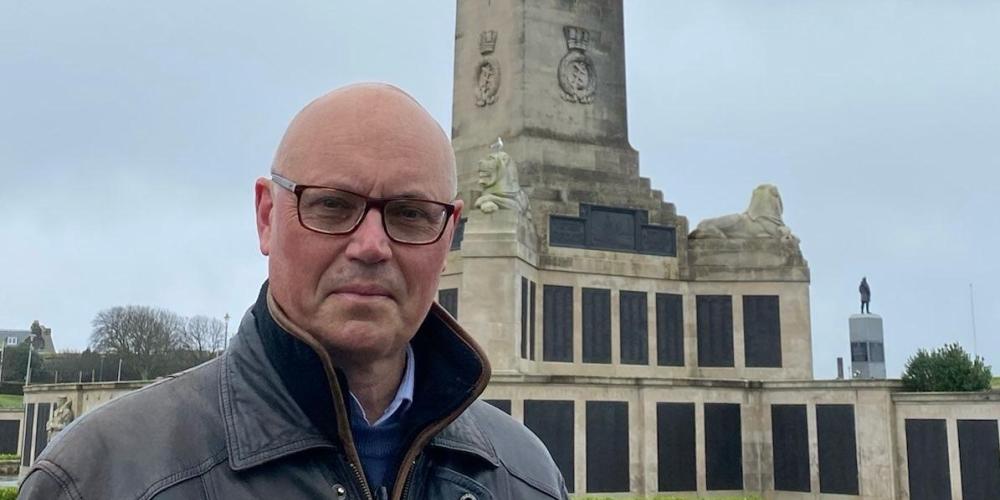
From the mediaeval bubonic plague to Covid-19, a pandemic always creates significant economic and social impact. British professor Mark Harrison, a historian at Oxford University and security adviser to the British government during the Covid pandemic, researches epidemics and the measures that governments take to contain them. “We are not ready for another pandemic. Confidence is gone, polarisation is worse than ever. If you don’t address that, all health measures are doomed to fail.” On 28 Febraury, Prof. Harrison is giving a lecture at VUB.
Anyone who thought Covid-19 was exceptional wasn’t paying attention in history class. In the middle of the 14th century, bubonic plague caused death and chaos worldwide. The Black Death was extremely contagious – touching infected clothes was enough to contract the disease – and deadly. In five years, more than 20 million people died in Europe alone, nearly a third of the population at the time. By comparison, Covid-19 has killed 7 million people worldwide.
The social, economic and cultural impact of the Black Death was enormous. Yet Mark Harrison, professor of the history of medicine at Oxford University, sees a positive: the first public health measures and organisations emerged in the wake of the plague.
Prof Harrison: “The bubonic plague first arrived in Italian port cities, via the trade routes with the East at the time. People had no concept of bacteria, but they did notice that ships brought the disease. That led to the first public health response in history. People took quarantine measures and isolated sick or suspected people in lazarettos, hospitals for plague victims. Streets were cleaned and contaminated clothing burned. Venice was the first city-state to establish a health council, which could impose such measures. In the centuries that followed, similar organisations arose all over Europe.”
Yet almost seven centuries later, we were not ready for Covid-19. Were we lulled by the fact that the last major pandemic was back in 1918?
“In the West, we were ready for the wrong pandemic: everyone expected some form of influenza, like the flu epidemics of the 1950s and 1960s. Our models were based on that. But Covid-19 turned out to be a very different disease. In the Far East, people were somewhat better prepared, due to recent experiences with MERS and SARS. For example, after the MERS outbreak in Korea in 2015, the country created links between health organisations, universities and industry. This allowed them to develop a test kit for Covid-19 at an early stage.”
Lecture & panel discussion with Mark Harrison
One pandemic is not the same as another, and during a pandemic there is usually little time for ethical reflection. Professor Mark Harrison is giving a lecture and participating in a debate on the subject at the VUB in Jette on Wednesday 28 February. The lecture is titled “The price of freedom: lessons learned from Covid-19 and other pandemics” and is part of the Knowledge in International Perspective lecture series, an initiative by Cornelis J Schilt, a knowledge historian and philosopher at the VUB.
After the lecture, Prof Harrison will discuss with VUB professors Cornelis J Schilt and Dirk Devroey which government measures are reasonable, and which are exaggerated during international health crises. The moderator is philosopher and VUB PACT curator Alicja Gescinska.
What was the problem with our models being based on influenza?
“From past epidemics, we knew that restrictions on movement can work. With influenza, this works with relatively short measures; with Covid-19 it kept dragging on. That’s an important lesson to take away: you can’t sustain very strict measures for very long. The social knock-on effects are disastrous, and people just don’t keep it up. As a result, they follow the rules less and less well and they contribute to a faster spread.”
It was especially hard on children and young people.
“In the beginning, these groups were more than willing to do their part so that older people would not die. But the restrictive measures went on and on. The impact was huge: on their mental health, their school results, their career prospects... This intergenerational inequality was not sufficiently recognised. There was never a real ethical debate about whether it was desirable to restrict social contact between young people so severely for so long in order to save the lives of the older population. I am not saying there is a right or wrong answer, just that the debate has not been had.”
"In the West, we were ready for the wrong pandemic."
An ethical debate in the middle of a pandemic sounds difficult.
“It is. But when it became clear that the fight against Covid-19 would be long, it should have been done, especially since young people in particular were testing the limits of the Covid measures or openly rebelling against them. In the long run they flouted the measures, that was clear. A government has to take that into account when it introduces control measures.”
China imposed strict, prolonged lockdowns, Sweden took a loose approach, where people retained a lot of freedom. Other countries were somewhere in between. Who was right?
“There is no single answer to that. The geography, the economy, the socio-ethnic composition, the trust in politics and authority figures ... each country is different. What works in one place will fail elsewhere. An island like Taiwan can be hermetically sealed; an open economy like Belgium is much more difficult. Measures that Chinese people accept would not work in the UK. That is another important lesson from Covid-19: there is no one-size-fits-all approach to a pandemic. You have to understand the disease itself and figure out how, ideally, you would best tackle it, but then you also have to look at the feasibility in your country.”
“There is no one-size-fits-all approach to a pandemic.”
Did the Swedish approach work because the population has faith in the government?
“In general, Swedes are apparently more willing to regulate themselves than elsewhere in Europe. But this is not a static fact. Societies also learn. Everyone now knows from experience how difficult mandatory lockdowns are. Perhaps during the next pandemic, people in other countries will be more willing to engage in self-discipline and self-regulation. Belgium could then also try the Swedish model.”

How was Covid-19 different from the previous pandemics you study as a historian?
“Pandemics are known to bring out and exacerbate social fault lines. During the third plague pandemic, around 1900, strict quarantine measures by British authorities led to much resentment and protest in the colonies in India, Hong Kong and South Africa. Some of the measures may also have been racially motivated. So I was not really surprised that Covid-19 also exposed social fault lines. In the United Kingdom, for example, the Covid measures and the vaccination campaign brought out a latent fear: the fear of losing control to a technocratic elite and being dehumanised by technology.”
So the polarisation that was already there became deeper?
“Certainly. Moreover, in response to Covid passports, new identities arose and hardened, on both ends of the spectrum. You got frantic advocates of hard lockdowns, Covid passports to go out and mandatory vaccinations, but also people who were deeply annoyed by it. Those views have been an intrinsic part of their identity ever since. What’s also unusual in the historical context is how opposition to Covid passports became an international phenomenon.”
This pandemic has an unexpectedly long tail, doesn’t it?
“In terms of fatalities, Covid-19 was insignificant. But in terms of political repercussions, I think it was the most significant pandemic since the Black Death. There was already a lot of pressure on society from globalisation, technology and new forms of communication. Covid-19 added to that.”
Are we ready for another pandemic?
“In the current political and social context? No. Divisions and distrust in each other and in government are so great that it would be extremely difficult to impose even a short-term lockdown. It will take years to restore that trust. People haven’t lost their trust just because politicians like Boris Johnson held secret lockdown parties. The problem goes much deeper than that. There is still too little awareness of that among policymakers and public health organisations.”
So what needs to happen?
“There is a need for real dialogue. Instead of demonising people or dismissing them as conspiracy theorists, we need to listen to their concerns and complaints. You can’t solve a pandemic or any other social crisis if you don’t understand why people are anxious and distrustful.”